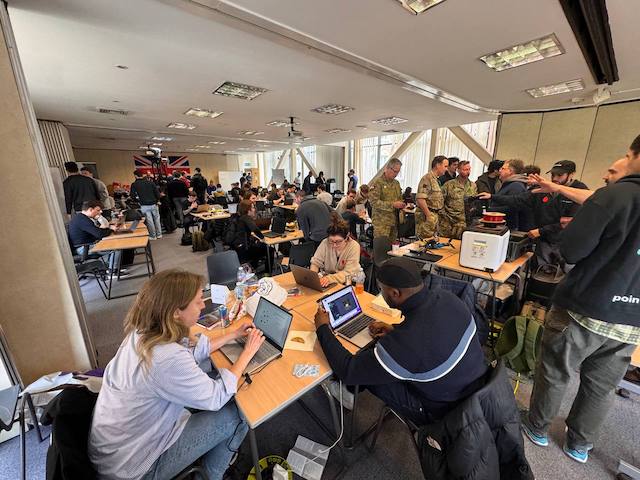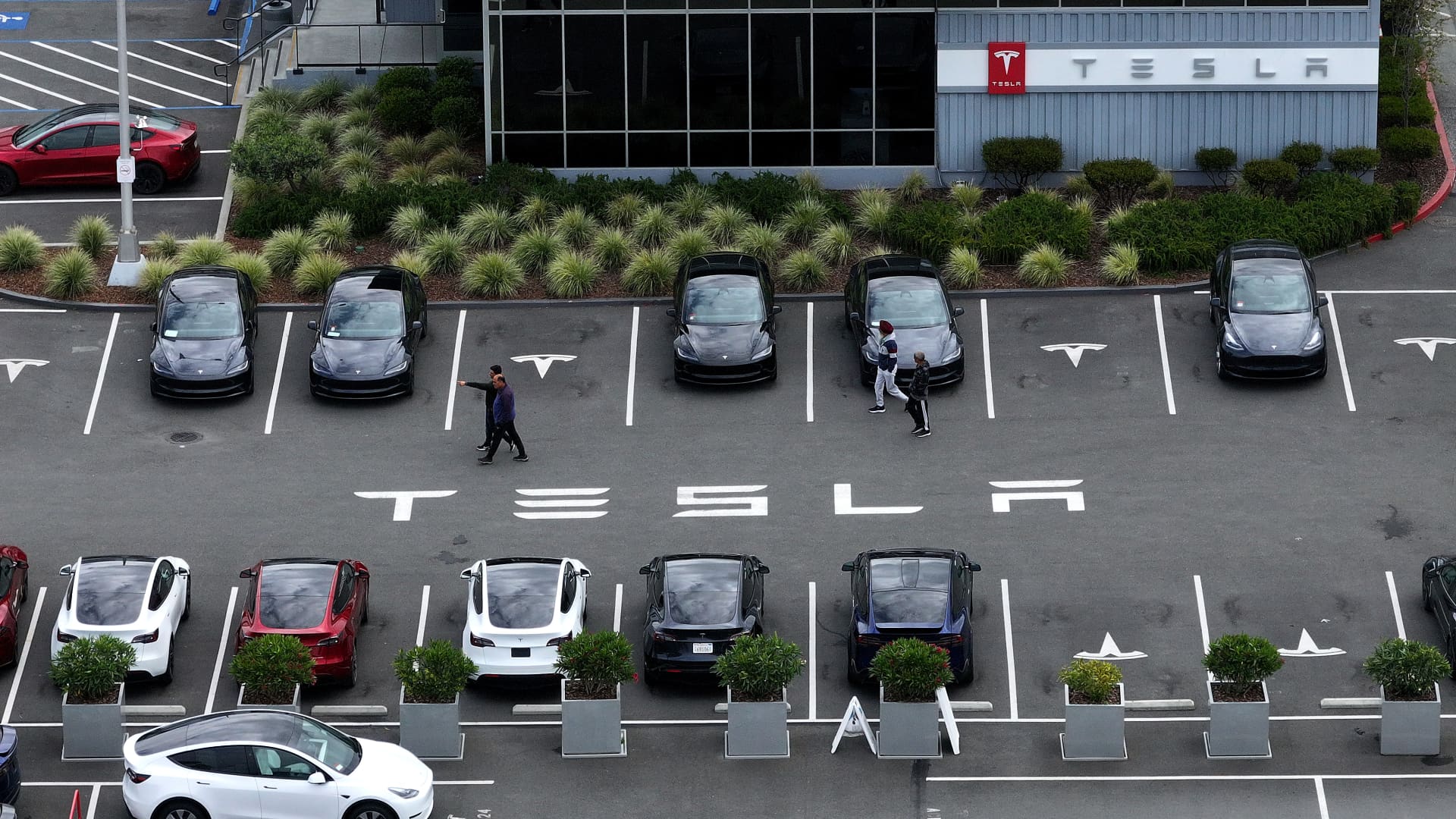
Great Britain announced this last week greatest ever military aid package for Ukraine. TThe bill brings total UK support for this financial year to £3 billion – not quite the $50 billion recently pledged by the US, but still substantial.
But while most of that money will be spent on very traditional military hardware, a new technology initiative launched last weekend aimed to boost Ukraine's asymmetric war capabilities against Russia. In fact the London Defense Tech Hackathon was the first ever event to bring together some of Britain's brightest minds in technology, venture capital and national security in a military setting. The idea was to bring together ideas to help Ukraine and also to create a much more porous layer between the worlds of fast civilian technology and the very different world of the military.
Compiled by Alex Fitzgerald of Skyral and Richard Pass of Future powersthe two were joined by co-organizers including the Honorable Artillery Company, Apollo defense, Lambda automata and D3 VC, among others.
The event brought together developers skilled in both hardware and software to advance innovation in defense, national security and deep tech. There was a major focus on drones and their battlefield applications, both the hardware and electronic systems required to fly them to their targets and counter-drone systems.
As most observers of the war have noted, this war has taken on a whole new dimension compared to previous wars. Today, drones and electronic countermeasures are the order of the day as Ukraine has attempted to combat Russia, a much larger aggressor, with asymmetric methods.
Fitzgerald told me, “There There are three groups of people who come to these events. There are the builders, investors and the military. I think it's an effort for everyone to convince their colleagues to think more about defense technology as an option to build or invest in.”
He explained that there were two main tracks: electronic warfare and drone or aerial systems: “There's an acronym I learned from someone smarter than me, which is that the future of defense technologies is small, cheap and unmanned.”
He explained that one main goal was to get people who haven't traditionally been involved in defense to build or invest in defense: “We have people like the NATO Innovation Fund, the UK National Security Strategic Investment Fund. So yes, it is a mix of people who are already investing in defense or who have not thought about it before.”
He chose the hackathon format because “the focus is on getting things done. Make sure you get real builders, and not just talk about building, because that is where most innovation takes place.”
One of the inspirations for the event was the recent one El Segundo, California Defense Technology Hackathon in February this year.
“I think the most important thing with military technology is that it is as easy to use and as powerful as the consumer technology that has been developed,” Fitzgerald says. “There's the classic line: 'There's more AI at the drop of a hat in Snapchat than there. is often one of the most modern military systems. ''
Catarina Buchatskiy was also present at the event Apollo defense. As engineers pored over cameras, Starlinks and drones, she told me: “Defense technology is a sector that is difficult to enter. And it's a tough market to break into for obvious reasons. We think Hackathons are an extremely exciting way for people to get involved, because defense technology can seem like a giant black box with contracts that last ten years, and technologies that are built [are often] hidden from the public eye. At a hackathon you have 24 hours. Make it something really cool.”
Interceptor ready
She said the company had had “great success” with the El Segundo event.
“We just realized that if people think it's something that's accessible to them [and] can do something quickly and make an impact, they want to participate,” she told me.
Buchatskiy, who is Ukrainian, also spoke strongly about Ukraine: “These are very real things for me. When I say I need a drone detector, it's because I'm looking outside my window at a drone that we didn't spot in time and that will kill my neighbor. That is the reality we face.”
She added that it is important for hackathon participants to know “that they are building for someone and that this could actually save my family's life.”
Despite the controversy surrounding defense technology in some quarters, she added: “Being involved in technology means being interested in a better future. And I really cannot think of a more interesting and better future than one that is safe and in which we can guarantee peace.”
NATO was also represented, in the form of the NATO Investment Fund, a fund with one billion euros to invest in defense technology in the coming years.
Fund partner Patrick Schneider-Sikorsky told me the fund was created to support startups “that strengthen our collective defense security and resilience. We invest in dual-use deep tech, but the fund was established before the war in Ukraine. The conflict has now had a major impact on our investment thesis and we are keen to invest in defense technologies that can make Europe increasingly secure.”
But why did NATO fund a hackathon?
“I think defense technology is new to a lot of founders and a lot of developers,” Schneider-Sikorsky said. “It is not that easy for them to understand the problems and challenges and also gain access to the end users.”
He said the hackathon format is particularly suited to this: “Normally, it would take months, if not years, for many founders to get in touch with the right people at the Ministries of Defense, and many of them are here today. So hopefully it will speed things up substantially.”
Another investor present, Alex Flamant of HCVC, told me: “There was a need for people in Europe to invest in good defense technologies. From an investor's point of view, it seemed that there were restrictions on certain investors investing. One of the goals of this is to unravel what a lot of this is among young builders, and to really get people more aligned with the big mission that we're all on.”
Machine learning specialist was present to focus on drone detection: “That is in our knowledge of machine vision and object detection. Ukraine is currently fighting for the whole of Europe and, of course, Great Britain plays a crucial role in this. It is essential that we ally with them and use what we have to help.”
The hackthon came at a time of increasing tension around the use of defense technologies.
Google recently fired 28 employees following their sit-in protest over the controversial Project Nimbus contract with Israel.
However, defense is clearly higher on the technology agenda.
Anduril recently moved moving forward in a Pentagon program to develop unmanned fighter jets, and more broadly, as we learned last year, venture capital is opening the gateways for defense technology.
And that does exist in Great Britain a lot of talk about how powerful lasers could be among the next wave of weapons. The DragonFire weapon is said to be accurate enough to hit a £1 coin from a mile away, and costs just $15 to fire, according to the Ministry of Defence.
The projects resulting from the hackathon maybe not quite as sci-fi, but they were pretty close. How about a “High speed Interceptor to take down Orlan Drones”? And in any case, they are likely to be deployed much sooner than a laser rifle.













